A country in despair, a continent in transition, and an internationally acclaimed curator enacting the power of art: "No Country for Young Men" has all the makings of a seminal exhibition. Curated by Katerina Gregos, with 32 artists and collectives, as well as a potent satellite project, it exposes alternative narratives, potentials, and perspectives of a crisis that feels more abstract after every summit talk.
Greece was the first poster child of the European monetary crisis. That was seven years ago, when "crisis" still referred to a turning point, a brief moment with urgent demands for exceptional intervention. Today, the crisis turns out to be neither singular nor brief. There are as many crises as there are families, and what began with an economic and a political crisis lead to a moral crisis, an identity crisis, my crisis, your crisis, his, her, and its crisis, rolling into each other like snow, picking up speed as the avalanche storms down an endless hill. The stories beneath the fluff risk getting lost in the white noise. "It’s a continuity of crisis, and it's affecting everybody I know at home," says Katerina Gregos, who was kind enough to make some time between trips abroad to talk about "No Country for Young Men", the need for such an exhibition, and the role a project like this might play in the European cultural landscape.
No Country for Young Men: art in times of crisis
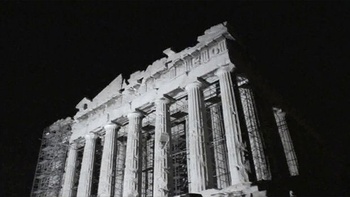
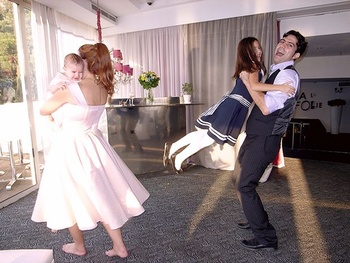
In the eight years she has been living in Brussels, the Greek curator has been the artistic director at the Centre for Art and Media Argos, and now Art Brussels, while maintaining a rigorous and consistent run of relevant curatorial projects, which include exhibitions such as "Speech Matters" in the Danish Pavillion of the 54th Venice Biennale, "Newtopia: The State of Human Rights" in Mechelen, "Manifesta 9" in Genk, and "The Politics of Play" at the Göteborg International Biennial for Contemporary Art. In a statement about "The Politics of Play", Katerina Gregos asked: “How can the understanding of political issues be transformed by the artistic imagination?” Now she has invited three generations of Greek artists to provide answers. Works shown are diverse in terms of medium, intent, interest, and approach, and include a Monopoly-inspired Greek reality game called Pawn Shop: Days of Mistrust by Lina Theodorou, Bill Balaskas’s video Parthenon Rising II, Alexandros Georgiou’s photograph Eros with New Wings, and Michalis Kallimopoulos’s water-colour and acrylic painting Investors in Winter, to name but a few. Across the street from Bozar, in the Atelier Bouwmeester, is a parallel project from a collective called Depression Era, which promises to take us past the age of happy endings. Depression Era pools the perspectives and talents of over 30 artists, photographers, writers, curators, and researchers in a collective story-telling experiment whose first objective is to locate "clarity, in the historical, political and social blur of the present."
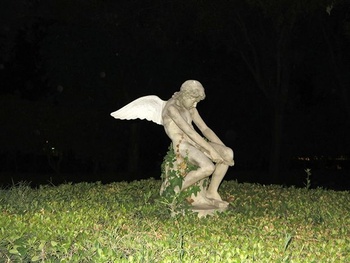
When did you first get the idea for this project?
Katerina Gregos: About a year ago when I found out that Bozar was going to organise a series of events coinciding with the Greek Presidency of the Council of the European Union. It seemed impossible to organise a Focus on Greece nowadays without taking into account the ongoing crisis that has transformed the country in so many ways.
Is it a critical survey of contemporary Greek art during an era of ongoing-crises, or a specific look at transformations in Greece?
Gregos: Both. The crisis is not limited to Greece, but the way it has taken shape there is perhaps the most dramatic and extreme example. It’s to the point where we are witnessing situations that we have not seen since the Second World War, in terms of material deprivation and demise in quality of life for a large segment of the population, particularly the middle class. The Greek case is perhaps so relevant right now, because it is also a cautionary tale, in the sense that Greece is perhaps a victim of extreme policies of austerity, which in the end have not yielded the desirable "result" (i.e. according to the criteria of the Troika). There is no doubt that change was necessary in Greece and that we have our fair share of the blame for the current impasse, but what is being done today is fundamentally anti-humanitarian in many ways, especially vis-à-vis the undermining of the welfare state. This is certainly not the way to go forward.
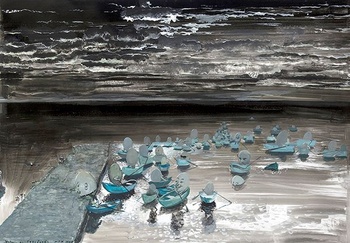
Broadly speaking, how might art assist us with "ways forward"?
Gregos: Art per se cannot change the world on a macro level - perhaps on a micro level -, but what it can do, is change the way we think about the world, how we perceive and understand it. And that is no small thing! Art can crack open cemented opinions. It opens up horizons. It challenges givens and standardised or problematic views of the world. It brings to the fore hidden or marginalised stories or narratives. It sheds light on the side-lined and draws attention to that which needs to be noticed. Art changes things in very subtle ways, and that is its great power. I consider art, in that sense, to also function as the conscience of society - though that is not necessarily its primary goal. At the same time, rather than accepting the world as it is, it imagines the world as it could be. As Greek philosopher Kostas Axelos (1924-2010) put it: "Art is the ultimate creative, productive force, because it forces us to say, to see and to hear that which, without art, would not be said, seen or heard."
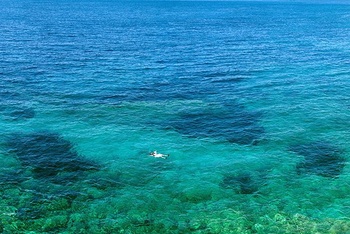
Was this your goal? To say, see and hear that, which isn’t articulated?
Gregos: My goal is to make exhibitions that are politically and socially relevant, without losing sight of art and the artists. I am very skeptical of the kind of art that offers a literalistic (i.e. simplistic) and often didactic representation of reality and masquerades as "political art" - a term I am also suspicious of -, the kind of art where there is no aesthetic filtering, interpretation, or transformation, which are so necessary if we are to look at things with different eyes.
That’s so important. A contribution art makes, which science, politics, or journalism for example, are not necessarily able to.
Gregos: Yes. Art goes beyond that which is to be understood literally. Beauty, poetry, humour, and performative action are valid strategies of resistance to combat doom and gloom, and allow for the visualisation of the crisis in its complexity, but they can also contribute to imagining the world differently.
NO COUNTRY FOR YOUNG MEN • 26/3 > 3/8, di/ma/Tu, wo/me/We, vr/ve/Fr > zo/di/Su 10 > 18.00, do/je/Th 10 > 21.00, Bozar, rue Ravensteinstraat 23, Brussel/Bruxelles DEPRESSION ERA • 26/3 > 16/5, 7/7, Atelier Bouwmeester, galerie Ravensteingalerij 54-59, Brussel/Bruxelles, www.bozar.be
Read more about: Expo
Fijn dat je wil reageren. Wie reageert, gaat akkoord met onze huisregels. Hoe reageren via Disqus? Een woordje uitleg.